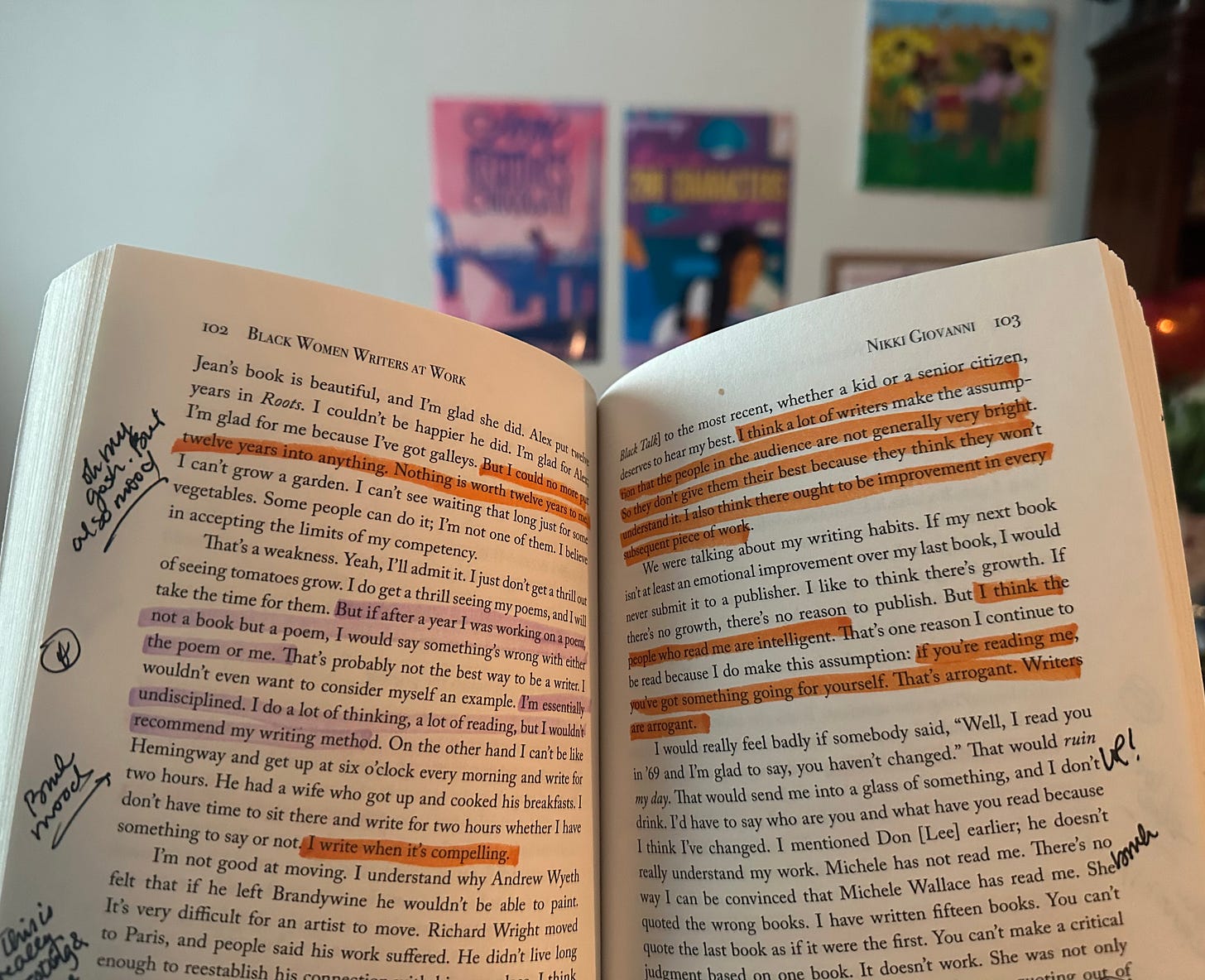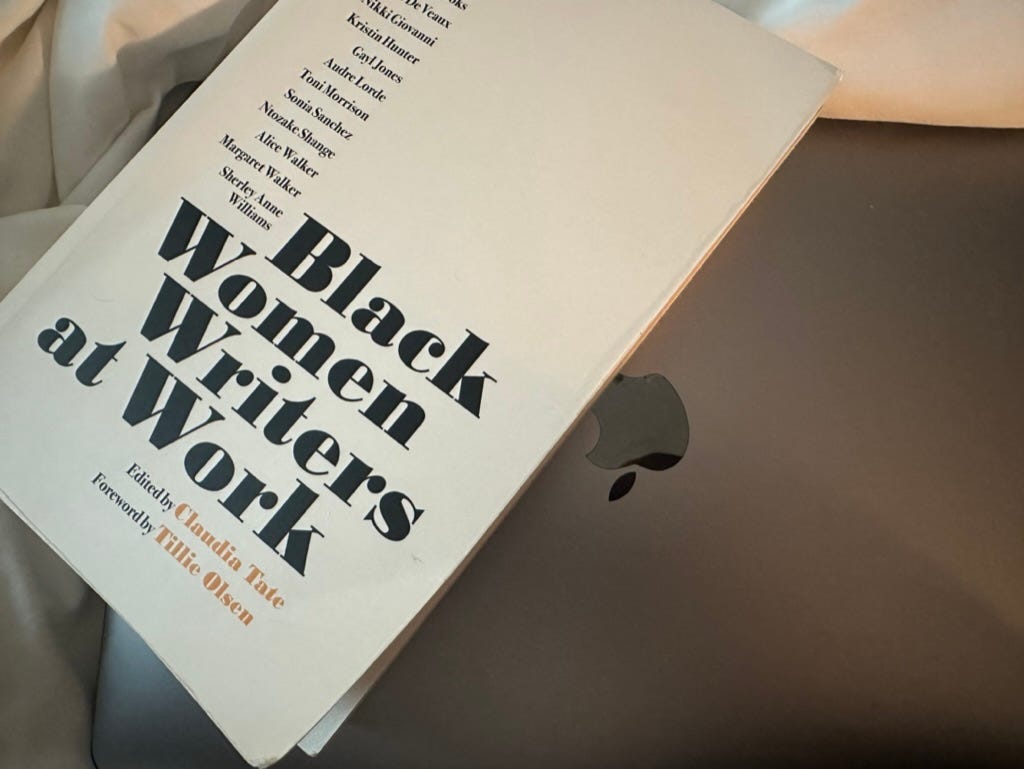“And when people tell me they just read [Meridian] once, I do have to smile because I just don’t see how you can read it once, and understand anything.”
—Alice Walker, Black Women Writers at Work, p. 225
“That, my dear, is reading.”
Growing up, I regularly reread books. Not just once, but dozens of times. I could quote passages and recall exactly what page or chapter events had occurred from a very early age. It was a comforting practice; I knew exactly how things were going to turn out. I knew how I would feel moving from one page to the next. Somehow, I was never short on delight; each rereading was just as satisfying as the first time I read it.
The practice of rereading fell to the wayside somewhere between wading through twenty-five to thirty novels a semester in undergrad and finishing my doctorate. In the last year, though, my life has stopped being quite so jam packed. I have enough time to pause and breathe before undertaking new tasks or opportunities, instead of running through activities, barely catching my breath before sprinting on to the next. I wanted to dedicated some of that extra mental space to revisiting some of my most beloved reads.
Black Women Writers at Work is one of those rare texts in which every sentence is a gem. The book is a collection of interviews conducted, compiled and edited by literary scholar Claudia Tate. Originally published in 1985 and reprinted by Haymarket Books in 2023, Black Women Writers at Work is part craft book, part reflections and meditations on creative life, and part political and social analysis. The fourteen authors included the likes of Toni Morrison, Nikki Giovanni, Ntozake Shange, Alice Walker and more.
To be frank: this book is a lifeline. Perhaps it may seem like I’m overselling, but creative life can be desperately lonely, and living at the intersection of that and Black womanhood is a special kind of isolation. I feel I have a community I can rely on: I have artist and scholar friends whom I trust dearly for rigorous (and ruthless) feedback they dole out in the same breath that they care for my spirit. I have parents who don’t quite understand the “how” of creative industry, but have proven that they will stand by me in whatever I chose to do.
And still.
Sometimes…
It is impossible to describe how the breath I take feels when I read Toni Morrison describing long periods of stillness that she is sometimes forced into that helps her hear stories more clearly. When she spoke about grieving the loss of her father, and how she went through a season of not rushing from thing to thing, she could hear. Even more validating was when Morrison said that it wouldn’t always occur to her that she needed those periods, to take them for herself of her own volition, so she ended up being grateful for them later.
For me, this season of my life has been exceptionally challenging, but I know I needed to be sat down. Knowing that I needed this time doesn’t change that fact that it’s difficult to explain to others. As a result, my tendency has been to slide back into the shadows in this season of stillness, and hope no one will notice my absence when I reappear.
This section of Morrison’s interview also highlights my need to reread. The page where she discussed this was unmarked when I arrived at it this time, despite my habit of rigorously annotating. I realized I’d had no need of that section the first time I read the book only two and a half years ago; now, it’s the only thing keeping me going.

The feelings are just so different when I return to a book after some time away. The first time I read Black Women Writers at Work, Nikki Giovanni was still with us. Coming back to it this time, I had to work up to rereading her interview. I read a page, and was so overcome that I simply had to put it down and try again the next day.
How odd to desperately miss someone you didn’t know. A person you had only encountered twice and who wouldn’t know you from Bob on the street. Knowing a woman like Nikki Giovanni existed gave me some measure of peace—perhaps I would one day grow up to be as honest and outlandish and clever as her.
And as always, I marvel at the ecosystem Black writers create for themselves. The pond is small, and everyone knows each other. I delight in the way they cite each other in interviews, speak the names of others not in the collection: if no one else remembers us, we will remember each other.
This time around, I was struck by Margaret Walker’s memories of Richard Wright, author of Native Son (1940), who it is clear she loved dearly. Walker wrote a biography of Wright (Richard Wright, Daemonic Genius), and spoke of the project at length. The messiness of the relationship terrifies me. Perhaps it is desperately romantic for two artists to be in love, but I can’t straighten out the tangle the dynamics make for their work in my mind. My mind keeps turning over what the consequences of a woman’s legacy is to be involved with a male artist. (I’ve been writing about this for a while now; I started drafting almost immediately after I finished Victoria Christopher Murray’s Harlem Rhapsody.)
On the positive end of the relationship spectrum, this collection has also been a point of conversation amongst me and a couple other writers, including Karen Strong and Shanna Miles. They have felt the call to return to this text as well, and we’ve had short exchanges online about it. I love that this gathering of writers can draw us to the table together across time. Their 1980s concerns are mine today as I navigate my way through a career in publishing.
More than anything, it gives me hope. A reminder that I’m not alone and nothing I’m experiencing is new.
As Octavia E. Butler would say, “There is nothing new under the sun, but there are new suns.”






Yes! I finished Heavy by Kiese Laymon and it influenced me to reread more than I do. There’s always something more to take away from a work especially in new life circumstances
Beautiful. This summer I am doing a lot of rereading. Also makes me think of https://www.nytimes.com/2021/11/09/opinion/ezra-klein-podcast-kiese-laymon.html